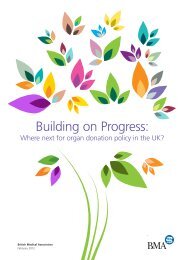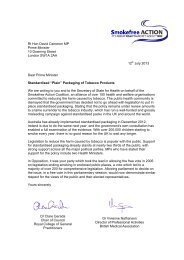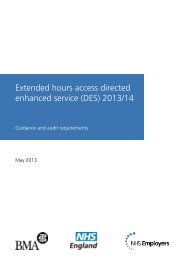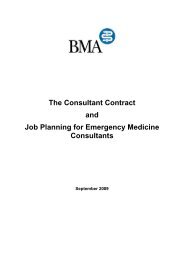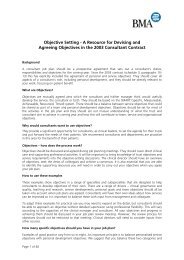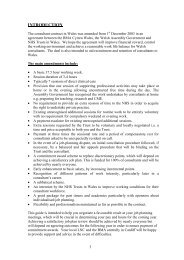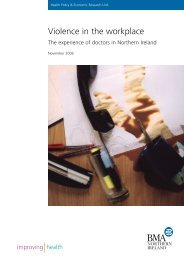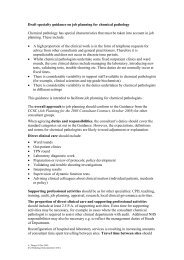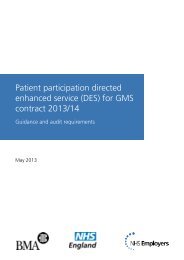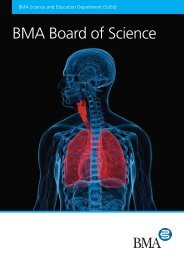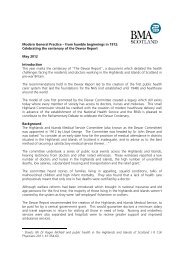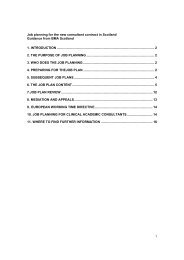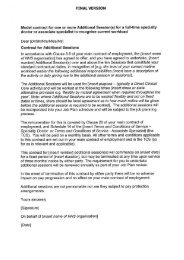The Consultant Contract: - BMA
The Consultant Contract: - BMA
The Consultant Contract: - BMA
Create successful ePaper yourself
Turn your PDF publications into a flip-book with our unique Google optimized e-Paper software.
<strong>BMA</strong> Scotland<br />
<strong>The</strong> <strong>Consultant</strong> <strong>Contract</strong>:<br />
Supporting Professional Activities (SPAs)<br />
February 2010<br />
What are SPAs?<br />
<strong>Consultant</strong>s have always been leaders in developing and improving the delivery of patient care.<br />
Since 2004, a clear and specific amount of time has been allocated in consultants’ job plans to<br />
recognise this work, which is called “Supporting Professional Activities” (SPAs). SPAs are at the heart<br />
of what it means to be a consultant and exemplify the added value that consultants bring to the NHS.<br />
It is during the time made available through SPAs that consultants are able to improve and hone<br />
their skills through auditing their practice, researching, innovating, developing new techniques and<br />
building new services. Such activities are essential to the long term maintenance and improvement<br />
of the quality of the service provided to patients but do not represent direct, hands-on patient care.<br />
<strong>The</strong> consultant contract sets out the standard number of supporting professional activities, 2.5 per<br />
week on average or 10 hours (paragraph 4.2.2), that should be made available to a full time<br />
consultant, with variation from this standard split being subject to agreement between the<br />
employer and the individual consultant.<br />
Supporting professional activities (SPAs) form a key part of the job plan and the <strong>BMA</strong> strongly believes<br />
that it is essential to patients, the service and consultants themselves that SPA levels are maintained<br />
appropriately.<br />
SCOTLAND
<strong>BMA</strong> Scotland<br />
What do <strong>Consultant</strong>s do in their SPA time?<br />
Health services develop and undergo continual improvement through the efforts of consultants:<br />
by their professional commitment to remaining in lifelong education, by continuing to innovate and<br />
by taking the initiative to develop and introduce new services, thereby improving the quality of the<br />
service to patients.<br />
Supporting professional activities include:<br />
Continuing professional development (CPD)<br />
Teaching and training<br />
Management of doctors in training<br />
Audit<br />
Job planning<br />
Appraisal<br />
Revalidation<br />
Research<br />
Contribution to service management and planning<br />
Clinical governance activities<br />
Real life examples of how SPAs benefit patient care and service quality<br />
We asked consultants to give us real examples of how they use their SPA time. <strong>The</strong>ir answers highlight<br />
how vital SPA time is to ensure the best quality care for patients:<br />
<strong>Consultant</strong>, Dr Stephen Curran, used his SPA time to set up a community-based eating disorder<br />
service for his health board. In addition he was able to contribute to the setting up of a regional<br />
in-patient unit for eating disorders and participate in the NHS Quality Improvement Scotland (NHS QIS)<br />
committee which adapted the NICE guidelines on eating disorders for Scotland. He has also been able<br />
to set up an adult ADHD clinic and participate in the new Scottish adult ADHD special interest group,<br />
which seeks to raise awareness of this condition in adults, improve services and co-ordinate and<br />
facilitate research into this disorder.<br />
“SPA time is vital – it allows us to develop the service and ourselves in ways that may<br />
not produce immediately tangible results for individual patients but lead to vast<br />
improvement in the service in the long run.”<br />
Graham Tydeman, <strong>Consultant</strong> in Obstetrics and Gynaecology, NHS Fife<br />
Dr Tydeman designed and implemented one of the first fully integrated video archive, telemetry and<br />
electronic reporting and audit packages in fetal medicine – which is now used in over 30 units in the<br />
UK. He has set up one of the few congenital anomaly registers in Scotland. He has also invented a<br />
variety of new medical devices and teaching aids both solo and in collaboration with St Thomas (one<br />
was shortlisted for NHS London, Innovator Award) covering a range of topics from improving the<br />
detection of congenital heart disease to aid the delivery of an impacted fetal head at caesarean<br />
section. In addition he is on a variety of committees and groups within Scotland and the UK.<br />
<strong>The</strong> <strong>Consultant</strong> <strong>Contract</strong>: Supporting Professional Activities (SPAs) 2
<strong>BMA</strong> Scotland<br />
“When I started, this department was demoralised; low on skills, long waiting times,<br />
low patient turnover, crumbly clinic, dissatisfied clients. In two years and at no extra<br />
cost I led my team to turn this into a thriving department that won a Fife Partnership<br />
Excellence Award in 2006.<br />
“If I had not the time to do this, the department would have sunk into oblivion –<br />
affecting sexual & HIV healthcare needs for the whole of Fife. Today the situation<br />
is completely different, with the service reaching into every corner of Fife with good<br />
accessibility and acceptability by clients. Every Scottish and UK audit has shown us<br />
to be achieving well. We put forward our case and were able to move into new<br />
premises and are currently working towards an integrated service with family<br />
planning, psychology, ID etc. <strong>The</strong> time and effort that I was allowed as a single<br />
handed consultant to invest has reaped much more in terms of patient benefit<br />
and our professional satisfaction.<br />
“Straight-jacketing a consultant into a reduced SPA job plan will have a detrimental<br />
effect on service modernisation and delivery.”<br />
Indranil Banerjee, <strong>Consultant</strong> Physician, Department of Genitourinary Medicine, NHS Fife<br />
Alastair Murray, <strong>Consultant</strong> Orthopaedic Surgeon at the Royal Hospital for Sick Children in Edinburgh<br />
was able to create a new service for treating clubfoot in South East Scotland. He also developed<br />
several departmental databases to audit activity and outcome of common procedures to ensure quality<br />
of care. He has used his SPA time to set up and deliver a core skills course in orthopaedics for early<br />
years’ orthopaedics trainees, a new screening programme for hip dysplasia in West Lothian and a<br />
new childrens’ orthopaedic clinic in West Lothian.<br />
In addition, SPA time allows him to comply with the national audit requirements of key pathologies<br />
and activity and to maintain a logbook of operations which can be used to inform patients of his<br />
experience. He also spends SPA time attending committee meetings, such as those to plan and deliver<br />
a new childrens’ hospital, in his role as a Regional Surgical Advisor for the Royal College of Surgeons<br />
of Edinburgh (RCSEd), which delivers support to trainees and consultants in CPD, and as a member<br />
of the Scottish Collegiate Committee for Children’s Surgical Services.<br />
SPAs also provide the opportunity to undertake essential research. Mr Murray has conducted research<br />
into hip dysplasia in children with work aimed at identifying a marker for this condition to improve<br />
screening. He has also undertaken research into Perthes disease of the hip.<br />
<strong>The</strong> <strong>Consultant</strong> <strong>Contract</strong>: Supporting Professional Activities (SPAs) 3
<strong>BMA</strong> Scotland<br />
“In my SPA time I have instigated and developed a multi-disciplinary nutrition team in<br />
the hospital, have taken the role of lead clinician for nutrition, attended Food, Fluid and<br />
Nutrition Steering group meetings and helped to prepare for the QIS visit to examine<br />
the QIS Standards for nutrition.<br />
“I have also been principal investigator in our intensive care unit for the SIGNET trial,<br />
a large multicentre trial involving parenteral nutrition in critical care patients. This trial<br />
is likely to have significant implications for the use of glutamine in ICUs throughout<br />
the world.<br />
“I am currently principal investigator for two government-sponsored studies on patients<br />
with swine flu, SwIFT and GenISIS. I have helped to run ten audits with trainees which<br />
have been used to institute improvements to practice in the intensive care unit.<br />
“Also as part of my SPA time I have taken over as Intensive Care Medicine Tutor and<br />
have made many developments to the educational programme in the ICU, including an<br />
improved induction, recruitment of three educational supervisors, a system of feedback<br />
from trainees at the end of their attachment, x-ray meetings and a programme of<br />
tutorials and trainee presentations. I now run the rota for the trainees and am a<br />
member of the Scottish Intensive Care Society’s Education and Training group.”<br />
Marcia McDougall, Intensive Care and Anaesthetic <strong>Consultant</strong>, Queen Margaret Hospital, Dunfermline<br />
In addition to the activities described above, consultants are expected to ensure that their skills and<br />
knowledge are up to date in order to ensure patient safety and to deliver a quality service to patients.<br />
Continuing professional development (CPD) is an essential component of SPA time, as is preparation<br />
for revalidation and appraisal, which all doctors must undertake. <strong>The</strong> role of a consultant also involves<br />
teaching and training of junior doctors and medical students, and again time during SPAs is used for<br />
this purpose.<br />
“I believe that the activity we engage in during SPA time benefits the organisation and<br />
patients. It is very difficult to fit this in, even to 2.5 sessions. I believe that by limiting<br />
SPA time, it will be expected that more of this work will be done in unlimited overtime<br />
without remuneration. Recently appointed consultants will not be prepared to do this,<br />
as they are used to time based contracts, and as a consequence, the service will suffer.”<br />
Dr Sheena Pinion, <strong>Consultant</strong> in Obstetrics and Gynaecology, NHS Fife.<br />
Summary<br />
<strong>Consultant</strong>s are essential components of delivering quality patient care - leading teams, developing<br />
services and sharing expertise. <strong>The</strong>y are dedicated to the fundamental principles of the NHS and<br />
lead teams of healthcare workers effectively and efficiently, adding value to patient care.<br />
SPAs are not an allowance for the comfort of consultants, nor are they time away from the wards<br />
at the expense of patient care. Rather they are vital in allowing consultants the time and space to<br />
develop their skills, train junior staff and maintain and improve services and techniques which<br />
directly benefit patient care and safety.<br />
<strong>The</strong> <strong>Consultant</strong> <strong>Contract</strong>: Supporting Professional Activities (SPAs) 4



